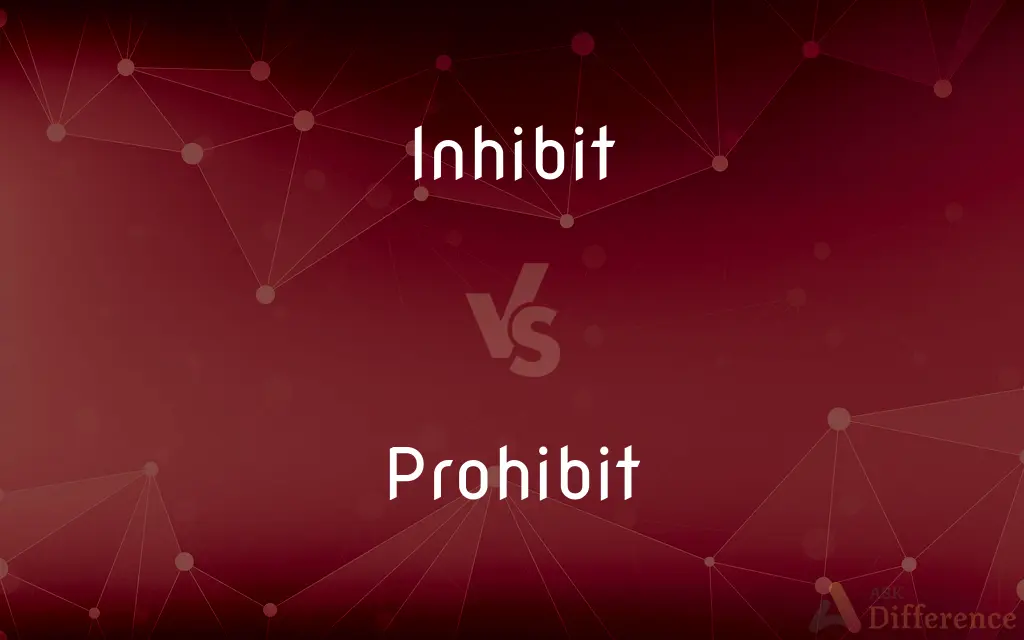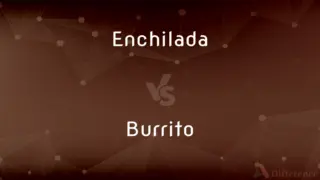Inhibit vs. Prohibit — What's the Difference?
By Tayyaba Rehman — Updated on October 3, 2023
Inhibit means to hinder or restrain an action or process, while Prohibit means to formally forbid something by law, rule, or other authority. Both involve restriction but differ in degree and manner.

Difference Between Inhibit and Prohibit
Table of Contents
ADVERTISEMENT
Key Differences
"Inhibit" implies imposing restrictions or limits, not allowing a process or action to proceed freely. On the other hand, "Prohibit" implies a more direct and formal prevention, often legally forbidding a particular action or activity.
While "Inhibit" may only slow or limit a process, "Prohibit" usually signifies stopping something entirely through a command, law, or rule. "Inhibit" may come without legal bindings, while "Prohibit" typically implies a strict forbiddance.
The usage of "Inhibit" often appears in a biological or chemical context, indicating the slowing or limiting of a process. Conversely, "Prohibit" often surfaces in legal and social contexts, indicating an official disallowance.
The word "Inhibit" conveys a suppression or restraint, whether physical or metaphorical, without necessarily involving legality. In contrast, "Prohibit" is often employed where a formal, often legal, restriction is involved, indicating an outright ban.
Importantly, "Inhibit" may suggest a reduction or diminishing of efficacy or function, without a total stoppage. Whereas "Prohibit" typically points towards a complete cessation, guided by an enforcing authority or ruling.
ADVERTISEMENT
Comparison Chart
Definition
Restrain or hinder
Formally forbid
Degree of Restriction
Limitation or reduction
Complete forbiddance
Context of Usage
Often biological/chemical
Often legal/social
Legal Implications
Not necessarily
Usually involves legality
Nature of Action
May slow or reduce
Aims to completely stop
Compare with Definitions
Inhibit
Inhibit also means to hold oneself back voluntarily.
She could not inhibit her laughter during the comedy show.
Prohibit
Prohibit also means to prevent from doing something.
His injury prohibits him from playing sports.
Inhibit
Inhibit means to restrain an action or process.
The drug can inhibit the growth of bacteria.
Prohibit
To prohibit can mean to shut out or exclude.
The policy prohibits outsiders from entering the building.
Inhibit
In a biological context, inhibit means to slow or stop a process.
Certain enzymes inhibit chemical reactions within cells.
Prohibit
Prohibit means to formally forbid by rule or authority.
The law prohibits smoking in public areas.
Inhibit
In the psychological context, inhibit means to consciously suppress.
He worked hard to inhibit his fears and present confidently.
Prohibit
Prohibit implies to disallow something expressly.
The school prohibits the use of phones in classrooms.
Inhibit
Inhibit can mean to put obstacles in the way of.
Lack of resources may inhibit the project’s progress.
Prohibit
Prohibit means to make impossible or unattainable.
Lack of evidence prohibits a conclusive decision.
Inhibit
To hold back; restrain
Barricades that inhibited the movement of the crowd.
A lack of knowledge that inhibited his inclination to ask questions.
Prohibit
To forbid by authority
Smoking is prohibited in most theaters.
Inhibit
To cause (a person) to behave in a restrained or self-conscious way
He felt inhibited by the presence of so many famous people.
Prohibit
To prevent; preclude
Modesty prohibits me from saying what happened.
Inhibit
(Psychology) To suppress or restrain (behavior, an impulse, or a desire) consciously or unconsciously.
Prohibit
(transitive) To forbid, disallow, or proscribe officially; to make illegal or illicit.
The restaurant prohibits smoking on the patio.
Inhibit
(Chemistry) To prevent or decrease the rate of (a reaction).
Prohibit
To forbid by authority; to interdict; as, God prohibited Adam from eating of the fruit of a certain tree; we prohibit a person from doing a thing, and also the doing of the thing; as, the law prohibits men from stealing, or it prohibits stealing.
Inhibit
(Biology) To decrease, limit, or block the action or function of (an enzyme or organ, for example).
Prohibit
To hinder; to debar; to prevent; to preclude.
Gates of burning adamant,Barred over us, prohibit all egress.
Inhibit
To prohibit (an ecclesiastic) from performing clerical duties.
Prohibit
Command against;
I forbid you to call me late at night
Mother vetoed the trip to the chocolate store
Inhibit
(transitive) To hold in or hold back; to keep in check; restrain.
Inhibit someone's freedom
Inhibit someone's education
Inhibit
(Philippines) To recuse.
Inhibit
To check; to hold back; to restrain; to hinder.
Their motions also are excited or inhibited . . . by the objects without them.
Inhibit
To forbid; to prohibit; to interdict.
All men were inhibited, by proclamation, at the dissolution, so much as to mention a Parliament.
Burial may not be inhibited or denied to any one.
Inhibit
To cause the rate of (a chemical or biochemical reaction) to proceed slower, or to halt; as, vitamin C inhibits oxidation; penicillins inhibit bacterial cell wall synthesis.
Inhibit
To restrain (a behavior) by a mechanism involving conscious or unconscious motivations.
Inhibit
To put down by force or authority;
Suppress a nascent uprising
Stamp down on littering
Conquer one's desires
Inhibit
Limit the range or extent of;
Contact between the young was inhibited by strict social customs
Common Curiosities
What does prohibit stand for?
Prohibit refers to formally forbidding something through rule, law, or authority.
Can inhibit imply a complete stoppage?
Inhibit usually implies a limitation or hindrance, not necessarily a complete stoppage like prohibit.
Are inhibit and prohibit synonyms?
While they both pertain to restrictions, they are not perfect synonyms due to differences in degree and formality of restriction.
Is prohibit stronger than inhibit?
Yes, prohibit often implies a complete and formal forbiddance, making it stronger or more absolute than inhibit.
How is inhibit used in a biological sense?
In biology, inhibit might refer to slowing or stopping a biochemical process or reaction.
What does inhibit mean?
Inhibit means to restrain, hinder, or slow down an action or process.
Does inhibit always imply a physical restraint?
No, inhibit can imply both physical and non-physical restraints, such as psychological inhibitions.
Can I use prohibit in everyday conversation?
Yes, prohibit can be used in everyday language to express a strict forbiddance of an action.
Is inhibit used in legal contexts?
Inhibit is not commonly used in legal contexts, where prohibit is more applicable due to its formal and absolute sense of forbiddance.
Can something be both inhibited and prohibited?
Yes, an action can be both inhibited (slowed or hindered) and prohibited (formally forbidden), depending on the context.
Can prohibit be used without legal implications?
Prohibit often, but not always, involves a formal or legal sense of forbidding something.
Can inhibit imply a gentle restriction?
Yes, inhibit can imply a milder, non-absolute restriction compared to prohibit.
Can inhibit refer to a psychological context?
Yes, inhibit can refer to consciously suppressing thoughts or emotions in a psychological context.
Can prohibit imply a moral or ethical restriction?
Prohibit may imply moral or ethical restrictions, especially if a law or rule is based on moral or ethical grounds.
Is prohibit related to prohibition?
Yes, prohibit and prohibition both derive from the Latin "prohibere", sharing a theme of formal forbiddance.
Share Your Discovery

Previous Comparison
Enchilada vs. Burrito
Next Comparison
Welt vs. WelpAuthor Spotlight
Written by
Tayyaba RehmanTayyaba Rehman is a distinguished writer, currently serving as a primary contributor to askdifference.com. As a researcher in semantics and etymology, Tayyaba's passion for the complexity of languages and their distinctions has found a perfect home on the platform. Tayyaba delves into the intricacies of language, distinguishing between commonly confused words and phrases, thereby providing clarity for readers worldwide.
















































